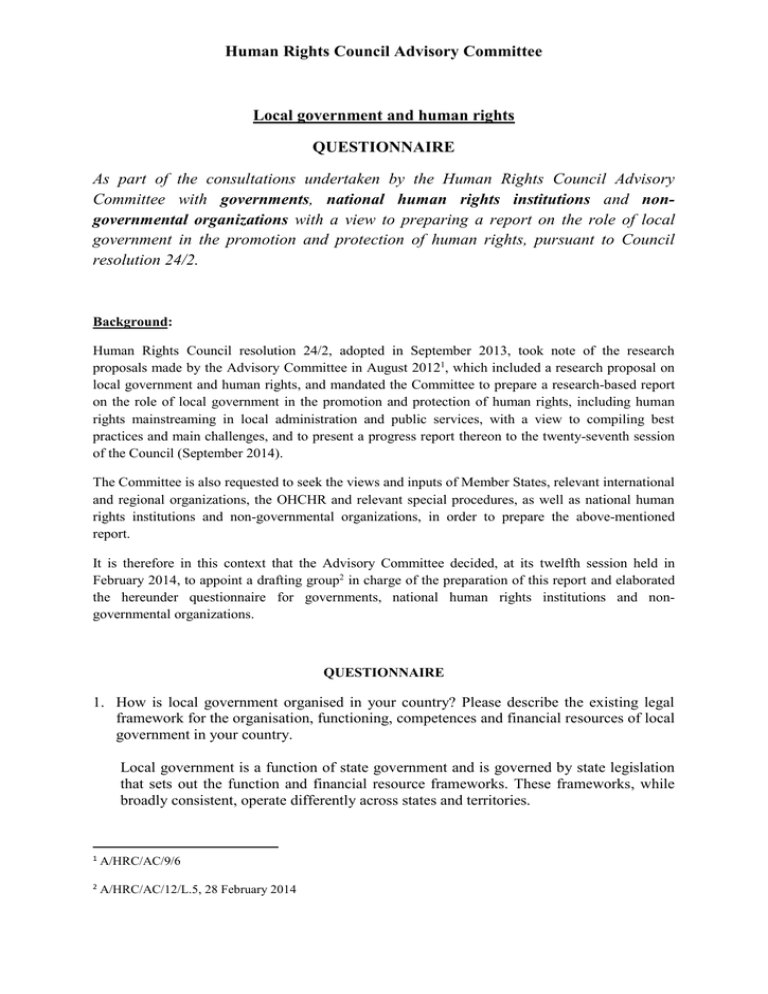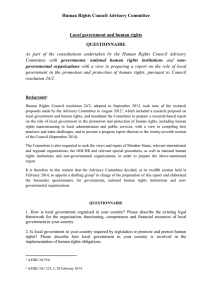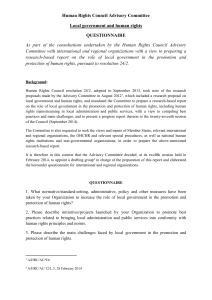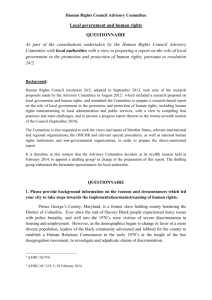Human Rights Council Advisory Committee Local government and human rights QUESTIONNAIRE
advertisement

Human Rights Council Advisory Committee Local government and human rights QUESTIONNAIRE As part of the consultations undertaken by the Human Rights Council Advisory Committee with governments, national human rights institutions and nongovernmental organizations with a view to preparing a report on the role of local government in the promotion and protection of human rights, pursuant to Council resolution 24/2. Background: Human Rights Council resolution 24/2, adopted in September 2013, took note of the research proposals made by the Advisory Committee in August 20121, which included a research proposal on local government and human rights, and mandated the Committee to prepare a research-based report on the role of local government in the promotion and protection of human rights, including human rights mainstreaming in local administration and public services, with a view to compiling best practices and main challenges, and to present a progress report thereon to the twenty-seventh session of the Council (September 2014). The Committee is also requested to seek the views and inputs of Member States, relevant international and regional organizations, the OHCHR and relevant special procedures, as well as national human rights institutions and non-governmental organizations, in order to prepare the above-mentioned report. It is therefore in this context that the Advisory Committee decided, at its twelfth session held in February 2014, to appoint a drafting group2 in charge of the preparation of this report and elaborated the hereunder questionnaire for governments, national human rights institutions and nongovernmental organizations. QUESTIONNAIRE 1. How is local government organised in your country? Please describe the existing legal framework for the organisation, functioning, competences and financial resources of local government in your country. Local government is a function of state government and is governed by state legislation that sets out the function and financial resource frameworks. These frameworks, while broadly consistent, operate differently across states and territories. 1 A/HRC/AC/9/6 2 A/HRC/AC/12/L.5, 28 February 2014 2. Is local government in your country required by legislation to promote and protect human rights? Please describe how local government in your country is involved in the implementation of human rights obligations. Local government is required to uphold legislative requirements to promote and protect human rights. The Federal Parliament has passed a number of laws which aim to protect people from certain kinds of discrimination in public life and from breaches of their human rights including: Australian Human Rights Commission Act 1986 Age Discrimination Act 2004 Disability Discrimination Act 1992 Racial Discrimination Act 1975 Sex Discrimination Act 1984 Both Federal and State Governments regulate human rights obligations on local government. 3. Is there any cooperation between local government and the central government in your country regarding the implementation of human rights at local level? If yes, please describe the existing cooperation framework. Local governments have an important role to play in creating fair and non-discriminatory policies and procedures that ensure equitable and consistent application of human rights principles in the local community. Local governments translate national policy into practical application contributing to building a stronger, creative and more liveable Australia for all Australians. For example, local governments must take the requirements of the Disability Discrimination Act 1992 into account when considering development approval applications. The local government peak body, the Australian Local Government Association (ALGA), Australia’s local government peak body, works cooperatively with the Human Rights Commission and promotes related skills development and activities to its constituents in local government. 4. Do you have human rights protection mechanisms at the local level in your country (e.g. ombudspersons, human rights commissions, mediators, etc.)? There are national and state level ombudsmen, fair work commissions, and special advocates such as the Human Right’s Commission; Children Commissioners and Privacy Commissioners. Where there are complaints around local government activities these would tend to be referred to the relevant national or state body. 5. What initiatives have been taken to include human rights mainstreaming in local administration and public services? All government services operate to a code of conduct that is inclusive of the recognition of human rights. 2 6. What is the role of civil society in the planning and implementation of activities for the protection and promotion of human rights at local level in your country? Australia has an enduring commitment to human rights internationally and is a party to major human rights treaties. Australia was one of the eight countries that drafted the Universal Declaration of Human Rights and we have been a leading proponent of its consistent and comprehensive implementation. Australia believes the protection and promotion of human rights is every nation's responsibility. We take this responsibility seriously including through our national human rights institution, the Australian Human Rights Commission and our Human Rights Framework. We have a strong democratic tradition, a transparent and independent judicial system and a free media. Our society is characterized by a sense of egalitarianism. We are committed to ensuring economic, social and cultural rights for all. 7. What is the role and programme of your organization for promotion and protection of human rights at local level or in enhancing local governance for human rights? As local government is a function of state government and is governed by state legislation, the Department of Infrastructure and Regional Development does not have a direct role or programme relating to human rights in local government. 8. What are the main challenges faced by local government in your country in the promotion and protection of human rights? Not Applicable to this Department 9. Please provide any best practices with regard to the above-mentioned issues. There is ongoing activity in the human rights and local government arena, with Victoria taking the lead. The Victorian Equal Opportunity and Human Rights Commission (VEOHRC) facilitate local government forums, developed a toolkit for local government, will review local government programs and practices on request to ensure they are compatible with the Victorian Charter of Human Rights and Responsibilities and provide training to local councils. The VEOHRC has undertaken an online survey of 79 local councils and produced a report, Rights in focus: Local government and the Charter of Human Rights and Responsibilities. The report highlights the progress local governments in Victoria have made in incorporating a human rights-based approach into their operations. Further information on the VEOHRC can be found at http://www.humanrightscommission.vic.gov.au/ 3 Deadline for submission of responses to the questionnaire: In order to give the Drafting Group the opportunity to take into account the different contributions, all parties are encouraged to submit their responses as soon as possible and at the latest by 11 April 2014. Answers can be submitted via email to the following address: hrcadvisorycommittee@ohchr.org OR Secretariat of the Human Rights Council Advisory Committee c/o Ms. Meena Ramkaun Office of the United Nations High Commissioner for Human Rights Palais Wilson, Room 4-060, Fax: +41 22 917 9011 United Nations Office at Geneva, CH-1211 Geneva 10, Switzerland Thank you for your contribution. For more information on the Advisory’s mandate: http://www.ohchr.org/EN/HRBodies/HRC/AdvisoryCommittee/Pages/HRCACIndex.aspx 4


